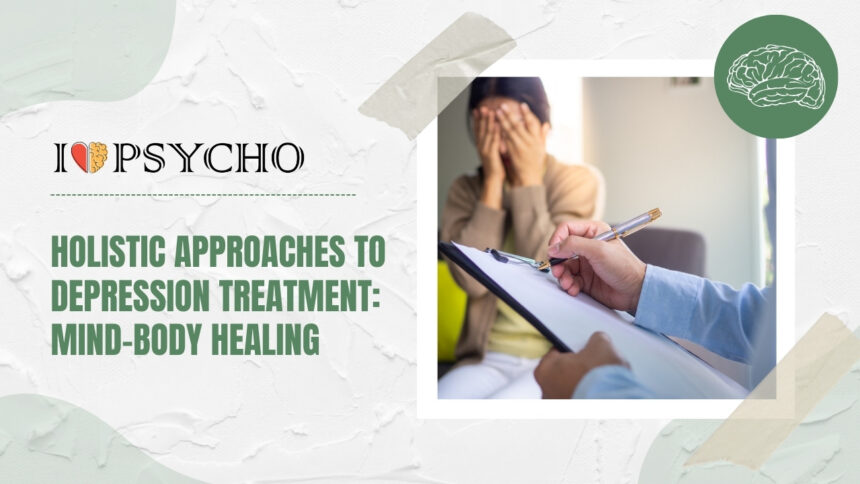Are you feeling overwhelmed, anxious, or down? You’re not alone. Depression affects millions of people worldwide, and the traditional approach to treatment doesn’t always address the root causes. But fear not! There’s a holistic way to tackle depression that focuses on healing the mind and body together for lasting wellness. Join us as we explore the transformative power of mind-body healing in combating depression and reclaiming your joy.
Understanding Depression and its Causes
Depression is more than just feeling sad; it’s a complex mental health condition that can impact every aspect of your life. While the exact causes of depression are not fully understood, a combination of genetic, biological, environmental, and psychological factors play a role in its development.
Genetics may predispose some individuals to depression, making them more susceptible to the condition when faced with certain triggers or stressors. Imbalances in brain chemistry, particularly neurotransmitters like serotonin and dopamine, can also contribute to the onset of depressive symptoms.
Environmental factors such as trauma, loss, chronic stress, or major life changes can trigger or exacerbate depression in vulnerable individuals. Additionally, certain medical conditions or medications may increase the risk of developing depression.
Understanding these various causes is crucial in tailoring effective treatment strategies for managing and overcoming depression.
Traditional Treatments for Depression
Traditional treatments for depression often involve the use of medication, such as antidepressants, to regulate brain chemicals and improve mood. Therapy, like cognitive-behavioral therapy (CBT) or interpersonal therapy (IPT), is also commonly used to address underlying issues contributing to depression.
In addition to medication and therapy, lifestyle changes can play a significant role in managing depression. Regular exercise has been shown to boost mood and reduce symptoms of depression. Eating a balanced diet rich in nutrients can also support overall mental well-being.
Furthermore, establishing a consistent sleep routine and practicing stress-reduction techniques are key components of traditional treatment approaches for depression. It’s important for individuals struggling with depression to work closely with healthcare providers to find the most effective combination of treatments for their unique needs.
The Rise of Holistic Approaches to Mental Health
As our understanding of mental health evolves, so does the way we approach its treatment. In recent years, there has been a noticeable shift towards holistic approaches to mental well-being, particularly in the realm of depression. This rise can be attributed to a growing recognition of the interconnectedness between mind and body.
Holistic approaches view individuals as whole beings, considering not just symptoms but also factors like lifestyle, diet, and emotional well-being. By addressing these aspects comprehensively, holistic treatments aim to promote long-term healing rather than just symptom management. This broader perspective allows for more personalized and integrated care that resonates with many seeking a more natural and sustainable approach to mental health.
From mindfulness meditation to yoga practices and herbal supplements, holistic therapies offer a diverse range of tools for managing depression. These approaches empower individuals to take an active role in their healing journey by cultivating self-awareness and resilience. The emphasis on prevention and self-care inherent in holistic approaches aligns with shifting attitudes towards mental health from reactive measures to proactive wellness strategies.
In today’s fast-paced world where stressors abound, embracing holistic approaches can provide a sense of empowerment and balance amidst life’s challenges. By recognizing the innate connection between mind-body-spirit, individuals can embark on a path towards greater overall well-being – one that nurtures not only their mental health but their entire being as well.
What is Mind-Body Healing?
Mind-body healing is a holistic approach to healthcare that recognizes the powerful connection between our thoughts, emotions, physical health, and overall well-being. It acknowledges that our mental state can significantly impact our physical health and vice versa. This approach focuses on treating the individual as a whole instead of just addressing symptoms.
At its core, mind-body healing emphasizes the importance of mindfulness practices such as meditation, yoga, deep breathing exercises, and visualization techniques to promote relaxation and reduce stress levels. By fostering a sense of calmness and inner peace, individuals can enhance their emotional resilience and cope better with life’s challenges.
Furthermore, mind-body healing encourages individuals to listen to their bodies’ signals and address any underlying emotional issues contributing to their physical symptoms. It empowers individuals to take an active role in their own health by cultivating self-awareness and practicing self-care rituals regularly.
In essence, mind-body healing seeks to harmonize the interconnected relationship between the mind and body for optimal health outcomes.
The Benefits of Mind-Body Healing for Depression
The benefits of mind-body healing for depression are vast and impactful. By addressing both the mental and physical aspects of well-being, this holistic approach offers a comprehensive way to combat the symptoms of depression.
One key advantage is the ability to reduce stress and anxiety levels through practices like meditation and yoga. These techniques help calm the mind, promoting a sense of inner peace and relaxation.
Furthermore, incorporating mindfulness into daily life can improve self-awareness and emotional regulation. This heightened awareness allows individuals to better understand their thoughts and feelings, leading to more effective coping strategies for managing depressive episodes.
Physical activities such as exercise release endorphins, which are natural mood boosters that can alleviate feelings of sadness or lethargy associated with depression.
Embracing mind-body healing techniques empowers individuals to take an active role in their mental health journey by fostering a deeper connection between their mind, body, and emotions.
Techniques and Practices for Mind-Body Healing
When it comes to mind-body healing for depression, there are various techniques and practices that can help promote overall well-being. One popular method is mindfulness meditation, which involves focusing on the present moment without judgment. This practice can help reduce stress and improve mental clarity.
Yoga is another effective way to incorporate mind-body healing into your routine. The combination of physical postures, breathing exercises, and meditation can help calm the mind and alleviate symptoms of depression. Additionally, acupuncture has been found to be beneficial for some individuals in reducing anxiety and improving mood.
Engaging in regular exercise like walking or dancing not only boosts endorphins but also enhances self-esteem and improves sleep quality. Journaling or expressive writing can be a therapeutic outlet for processing emotions and gaining insight into thought patterns.
Exploring nature through activities like forest bathing or gardening can have a grounding effect on the body and mind. Engaging in creative pursuits such as painting or playing music allows for self-expression and emotional release. These techniques offer holistic approaches to healing that focus on nurturing both the mind and body simultaneously.
Tips for Incorporating Mind-Body Healing into Your Daily Life
Incorporating mind-body healing into your daily routine doesn’t have to be complicated. Start by setting aside a few minutes each day for mindfulness practices like deep breathing or meditation. Find a quiet space where you can focus on calming your mind and relaxing your body.
Engaging in physical activities such as yoga, tai chi, or even just going for a walk in nature can help you connect with your body and release built-up tension. Pay attention to what you eat and how it affects your mood – incorporating whole foods and plenty of water into your diet can make a big difference in how you feel.
Make self-care a priority by indulging in activities that bring you joy, whether it’s reading a book, taking a bath, or spending time with loved ones. Remember to listen to your body’s signals and give yourself the rest and relaxation you need to recharge. By making small changes each day, you can cultivate a holistic approach to healing that supports both your mental and physical well-being.
Combining Traditional and Holistic Approaches to Depression Treatment
When it comes to treating depression, combining traditional and holistic approaches can offer a well-rounded solution. Traditional methods like therapy and medication provide necessary support, while holistic practices address the mind-body connection.
By integrating techniques such as cognitive-behavioral therapy with mindfulness meditation or yoga, individuals can experience a more comprehensive approach to healing. This combination allows for both symptom management and addressing underlying causes of depression.
Moreover, incorporating activities like acupuncture or aromatherapy alongside conventional treatments can enhance overall well-being. These complementary practices can help reduce stress levels, improve sleep quality, and promote emotional balance.
Finding the right blend of traditional and holistic therapies is key in creating a personalized treatment plan that caters to individual needs. It’s about embracing an inclusive approach that embraces all aspects of health – mental, physical, and emotional.
Conclusion
In today’s fast-paced world, where stress and anxiety are prevalent, it’s essential to explore holistic approaches to mental health like mind-body healing for treating depression. By understanding the root causes of depression and incorporating techniques such as meditation, yoga, and mindfulness into your daily routine, you can take a proactive approach towards improving your overall well-being.
Remember that seeking professional help is crucial when dealing with depression. Combining traditional therapies with holistic practices can provide a comprehensive treatment plan tailored to your individual needs. Embracing a holistic mindset that encompasses both the body and mind can lead to profound healing and long-lasting results in managing depression.
Take small steps each day towards implementing mind-body healing practices into your life. Be patient with yourself throughout this journey towards better mental health. By prioritizing self-care and exploring alternative methods of treatment, you can empower yourself to overcome the challenges posed by depression and cultivate a sense of inner peace and balance.
Finding what works best for you is key in navigating through the complexities of depression. By embracing a holistic approach that addresses all aspects of your being – physical, emotional, mental, and spiritual – you can embark on a path towards greater resilience, vitality, and joy in life. Remember that healing is possible; it starts from within.









